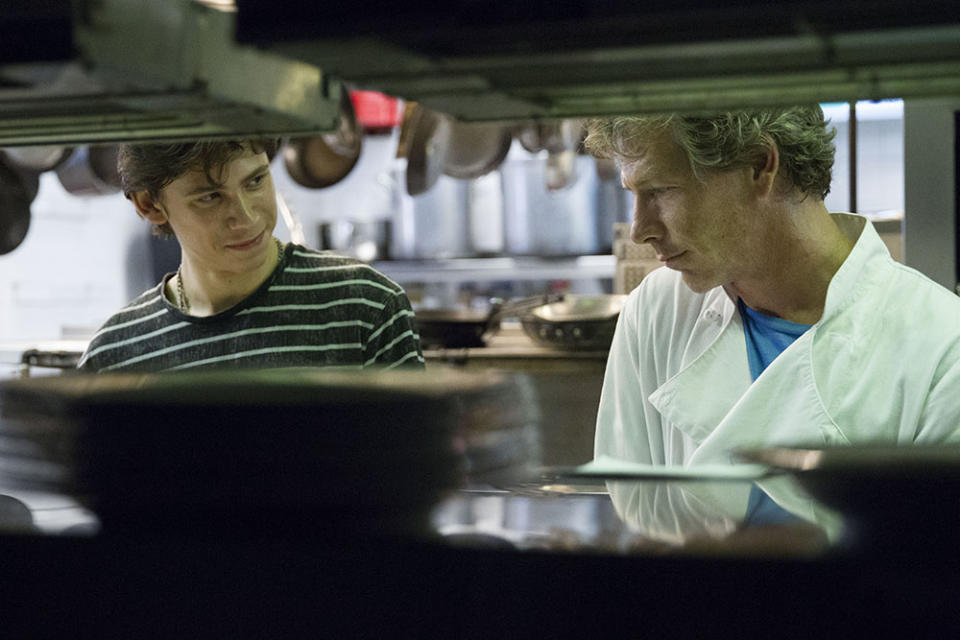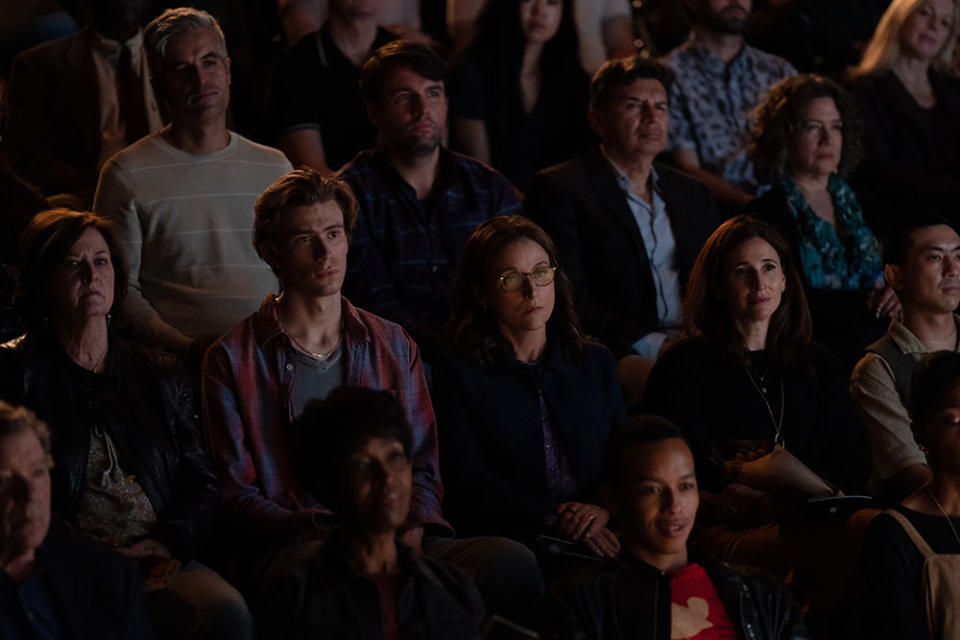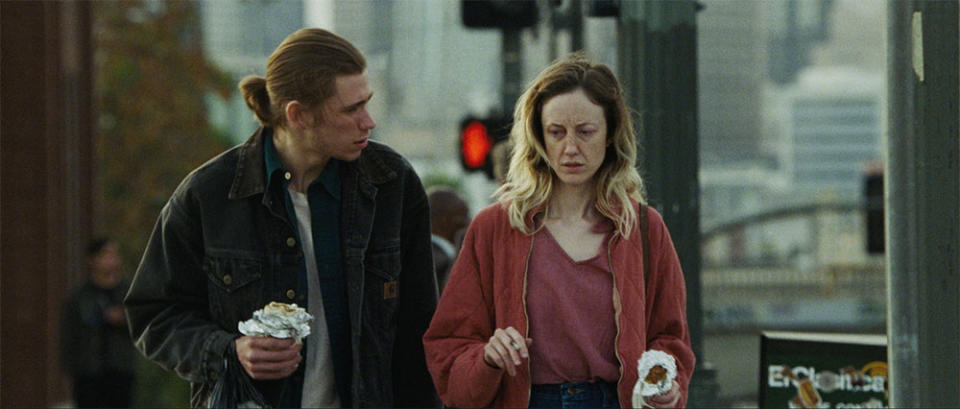Owen Teague Talks ‘You Hurt My Feelings’ and Meeting with Andy Serkis for the New ‘Apes’ Movie
- Oops!Something went wrong.Please try again later.
- Oops!Something went wrong.Please try again later.
- Oops!Something went wrong.Please try again later.
- Oops!Something went wrong.Please try again later.
- Oops!Something went wrong.Please try again later.
- Oops!Something went wrong.Please try again later.
- Oops!Something went wrong.Please try again later.

As massive as the entertainment industry is, there’s a small-world aspect to it that You Hurt My Feelings star Owen Teague can attest to as much as anyone. The Florida native’s career really took off when he was cast to play a young version of Ben Mendelsohn’s Bloodline character, Danny Rayburn, in mere photographs and old home videos, as that led to proper flashbacks and the critical role of Danny’s troubled son, Nolan. Andrea Riseborough also played his mother on the series, and two would later reunite as mother and son in Michael Morris’ To Leslie (2022), which garnered Riseborough one of the most improbable Oscar nominations of all time.
In the case of You Hurt My Feelings, writer-director Nicole Holofcener had previously cast Teague in the Kathryn Hahn-led series, Mrs. Fletcher, so the Oscar-nominated filmmaker went out to Teague for the role of Julia Louis-Dreyfus’ son in the character-driven comedy-drama. His character, Elliott, is an aspiring writer who wants to hear honest critiques of his work, something Teague relates to as well.
More from The Hollywood Reporter
Julia Louis-Dreyfus, 'You Hurt My Feelings' Team Break Down Fallout From "Betrayal"
Events of the Week: 'You Hurt My Feelings,' 'FUBAR' and More
'To Leslie,' Which Landed Andrea Riseborough an Oscar Nom, Sells Internationally (Exclusive)
“Elliott doesn’t believe that his writing is the best that it can be, and he wants to hear the truth about it. And that’s how I always feel about anything that I do. I’m always a little bit uncomfortable when I hear ‘good job’ because I never know if I can believe it,” Teague tells The Hollywood Reporter.
Teague recently wrapped his most substantial role to date as the lead ape in Wes Ball’s Kingdom of the Planet of the Apes, and the Apes casting director, Debra Zane, happened to be the one who cast him in those old photographs and home movies on Bloodline. In the sequel to Matt Reeves’ War for the Planet of the Apes (2017), Teague is reportedly playing Caesar’s (Andy Serkis) son, Cornelius, and as a longtime fan of Serkis, getting the chance to pick his brain about performance capture was a career highlight for him.
“[Andy Serkis] and I had a meeting, and he was part of why I became an actor,” Teague says. “So this was something that I’d been wanting to do my entire life, and it was literally a dream come true to get to do this job and play this character. I remember Andy being like, ‘You’ll get used to [performance capture] and you’ll stop worrying about it after the first week.’ And he was absolutely right.”
Kingdom of the Apes is also Teague’s first time as the lead of a huge studio film, and once it was pointed out to him, he struggled with a great deal of self-doubt.
“I had a bit of an existential crisis three weeks before we started shooting, and I was like, ‘I can’t do this,’” Teague recalls. “But then you just find your way back, and you realize that you know who you’re playing. I’m also not a terrible person, so I knew that people were going to enjoy working with me, at least I hoped.”
At the moment, Teague is feeling quite optimistic about his new chapter in the Apes franchise.
“This was the first time that I’ve left set and been like, ‘This is going to be awesome. We made something that’s completely amazing,’” Teague shares. “And I hope that’s true. God, I’m gonna look pretty stupid if it sucks, but I have complete confidence in everyone who’s working on that film.”
Below, during a recent conversation with THR, Teague also discusses his memorable first encounter with Mendelsohn on the Bloodline set, before sharing his thoughts on the To Leslie Oscar campaign controversy.
So I have to be honest with you. Every time I see you, I think of young Ben Mendelsohn, before I quickly adjust to the new work on the screen. That’s probably not what you want to hear, but your Bloodline role just made such a strong first impression. Is it true that you were originally hired to play a young version of Ben’s character in photographs?
Yeah, it was pretty random. I had been acting my whole life, but I had pretty much done only theater. And when they were casting for that young [Danny Rayburn] part, looking uncannily like young Ben was pretty much what got me the job. And then at the end of the first season, [co-creators Daniel Zelman and the Kesslers] were sort of like, “Hey, there’s this son character [Nolan Rayburn] that we’re writing in for season two.” So maybe they thought that I was able to actually act, as well as look like him.

When you first met Ben, was he pretty blown away by the resemblance?
I don’t really know how he felt. The first time we met was on the beach in Islamorada, and it was one of young Danny’s scenes. It was one of those Bloodline-esque flashbacks where young Danny was getting beat up, and we were all there: me, Norbert [Leo Butz], Ben and Kyle [Chandler]. And I was a kid, so I was intimidated by everybody. And then I remember Ben just looking at me and being like, “Hey, you really wanna do this, huh?” And I was like, “What do you mean?” And he was like, “Acting.” And I was like, “Yeah.” And he was like, “Well, it’s a lonely life, but alright.” And that was the first thing he ever said to me. I was like, “Wow, this dude is intense.” But he was nothing but very, very kind to me. He was really generous as well, because I was pretty green. I’d done a ton of theater, but that’s a different thing than a show like Bloodline. So he led me through things a little bit, but everyone on that show was really nurturing towards me.
Well, based on the fact that we’re talking right now, that job opened many more doors for you. Is that your sense as well?
Oh, absolutely. The casting director for Bloodline, Debra Zane, also cast Kingdom of the Planet of the Apes, which I just got back from shooting. She’s been championing me since I was a teenager. So I would not be here without that show, and I wouldn’t know half the things I know about the industry and the craft. Bloodline was my school, and I credit everything to that.
And one of those doors that opened is You Hurt My Feelings. Was there anything unusual about your casting process?
Well, I knew Nicole [Holofcener] from Mrs. Fletcher. She cast me for Mrs. Fletcher, and so she just sent me this script. Her presentation was really wonderful. It wasn’t like, “Do you want to do it?” It was more like, “What do you think? Do you like it?” (Laughs.) And I was like, “Of course, I do. I wanna do it.” So that was how that came about, and it’s always nice when people that you’ve worked with before want to collaborate again. I also knew some of the producers and some of the crew from Montana Story and other projects, so there was a sense of camaraderie on set. It felt like a bunch of friends getting together in New York and making a movie.

As a young actor, when you work with a group like Nicole, Julia [Louis-Dreyfus] and Tobias [Menzies], are you watching and listening closely for anything you can use down the road?
Totally. On every gig, you learn something new, and sometimes it’s because you approached something a certain way. Maybe you made a mistake or you didn’t quite achieve what you wanted to get across in your own work. And sometimes, it’s because you watch other actors work and you like their approach.So I’m always watching the actors who have more experience than me. It’s been that way since the very beginning, and I’m grateful to have worked with some legendary people. So you do pick things up.
Your character, Elliott, rants about his mother (Louis-Dreyfus) smothering him, both figuratively and then literally, as the ending shows.
(Laughs.)
He wishes she was more honest with him and offered less disingenuous praise. Do you think he has a point in general about the need to be more honest with each other?
It’s good to be honest with each other. Personally, I really understood Elliott’s sentiment, and that’s one of the things that he and I have in common. Elliott doesn’t believe that his writing is the best that it can be, and he wants to hear the truth about it. And that’s how I always feel about anything that I do. You’ll either get compliments on your work or people will tell you that it sucks, in which case, it feels bad, but at least you know that they’re being honest. Whereas when somebody tells you that you’re really great, it’s always kind of like, “How do I know that that’s real?” So I definitely get where Elliot is coming from, especially as somebody who creates something for other people to see. I’m always a little bit uncomfortable when I hear “good job” because I never know if I can believe it.
My biggest takeaway from this film is that every career has peaks and valleys. Work can dry up, sure, but your confidence in your work can also diminish. Your career is obviously heading upward right now, but have you prepared yourself for the inevitable ups and downs?
God, that’s a great question, and I’d love to have an answer to that because then I’d do it. (Laughs.) I’ve been very fortunate in having a lot of work through these last few years, and a lot of actors haven’t had that luck. But the one thing I’ve learned with the pandemic and how the industry has been shifting is that it’s important to have a life outside of your work. I’ve always very much equated myself with whatever work I’m doing, and so I’ve had to learn to separate a little bit. It’s not that I put less importance on it; I just don’t want to make it the entire purpose of being alive.
So I’m glad to have learned that and to have had some success in that, because it’s actually made the work easier. It’s made it more rewarding when I get to do something that’s really good or that I really connect to, and then I get to leave it. If I don’t connect to something or something doesn’t do what I am looking for, then it’s okay. So it’s just about finding stability in life, apart from the industry.

So, last October, I spoke to Michael Morris about To Leslie, and this was a month or two before things went absolutely crazy. Since you were probably shooting in Australia at the time, when or how did you start to catch wind of what was happening with Andrea Riseborough?
Well, people started texting me about it, and my mom actually heard about it before I did. I was in Australia, and I was pretty much oblivious to anything that wasn’t Apes-related. But she called me about it, and that’s how I hear a lot of things that maybe I should know about. (Laughs.) I didn’t follow it super closely, but I was really happy that she got a nomination. I remember shooting our scenes on the set of To Leslie and being completely blown away by what I was seeing and getting to play off of. The whole scandal element of it was just ridiculous. She’s a phenomenal actress. She deserved an Oscar nomination. Why was this a scandal? But that’s just my take on it.
Whether it’s that movie or Montana Story, I can’t imagine that you shoot such indies with any sort of expectation. Do you treat them as hidden gem-type movies that people will discover throughout time?
I mean, I don’t know that I think of those movies in any kind of way. I do them because they mean something, and I like them. So that’s kind of the extent of my thought about how they will be consumed. You hope that people watch them and get something from them, but it never feels good to make something that nobody watches. So it’s nice when people discover a movie like To Leslie or Montana Story, especially when they deserve to be discovered. But I don’t really think about it a whole lot.
So you landed your biggest role to date last year as the lead in Wes Ball’s Kingdom of the Planet of the Apes. How did you take to performance capture? Did you ask anyone for guidance?
Well, we all talked to Andy Serkis. He and I had a meeting, and he was part of why I became an actor. So this was something that I’d been wanting to do my entire life, and it was literally a dream come true to get to do this job and play this character. The hardest part about it was just learning how to be in a suit all day and have a camera strapped to your head. But you get used to it after about a week, and I remember Andy being like, “You’ll get used to it and you’ll stop worrying about it after the first week.” And he was absolutely right. The rest of motion capture is just what you would do otherwise, and the difference between a human and whatever you’re playing just becomes a costume, so you don’t even really think about it that much. It’s just acting and it’s no different. So I took to it very quickly and very happily, and it’s something that I’d like to do a lot more of. So I hope I get to, because I really enjoy it. It’s actually freeing. It’s the fun of acting boiled down to the very essence of what it is. You get to be anything you want, and it doesn’t have to be even remotely similar to what you are in real life. So you just have to put yourself in that being and exist. It was wonderful.
And how did you handle the responsibility of being number one on a huge studio movie and helping to set the tone?
Well, that was the funny thing. I didn’t really think about it until I was having dinner one night with Jason [Reed], one of our producers. He has a way of saying very true things, but in a way that makes them feel a little bit less heavy than they would be otherwise. He was like, “Well, you set the tone. You’re number one.” And then it hit me. I was like, “Oh my God, I am.” So I had a bit of an existential crisis three weeks before we started shooting, and I was like, “I can’t do this.” But then you just find your way back, and you realize that you know who you’re playing. I’m also not a terrible person, so I knew that people were going to enjoy working with me, at least I hoped. So, after I righted myself about that issue and found my confidence again through the discovery of the character, it was fine. It wasn’t even really a thing that crossed my mind ever. If you do good work and be a nice person and help your colleagues, then you don’t really need to think about it.
Could you sense what you were making even though it wasn’t going to be fully rendered for a while?
Totally. Most of that came from Wes, actually, because he was so convicted in his direction. He’s so visual, and so he could paint this picture for us, which actually made it very easy to imagine all this stuff. The rest of the cast was so supportive of each other, and we were such a tight group that it was very easy to make a movie like that with those people. I’m trying to not say any character names, but when I looked at other actors on set, I would see what I believed in my head to be this mix between them. So we didn’t think of ourselves as human by the end of it. We called ourselves “the apes.” We were the apes. So it was very realized for everyone, and we also created a very detailed world for ourselves. So it wasn’t hard to imagine what the movie would be. Normally, you come away from a project and you’re like, “Well, who knows how that’s gonna turn out. Half of it is editing.” But this was the first time that I’ve left set and been like, “This is going to be awesome. We made something that’s completely amazing.” And I hope that’s true. God, I’m gonna look pretty stupid if it sucks, but I have complete confidence in everyone who’s working on that film.
Well, I can’t wait to see it, and it’s cool to see what’s happening with you right now.
Thank you. It’s funny because I’ve heard that a few times lately, and I’m kinda like, “Huh. What is happening?” (Laughs.) So I guess something’s happening.
***
You Hurt My Feelings is now playing in movie theaters. This interview was edited for length and clarity.
Best of The Hollywood Reporter
Natalie Portman at Cannes: "I Need to Leave the Drama for the Screen"
Ailing ‘Superman’ Star Valerie Perrine Finally Finds Her Hero: "The Guy Should Be Sainted"

